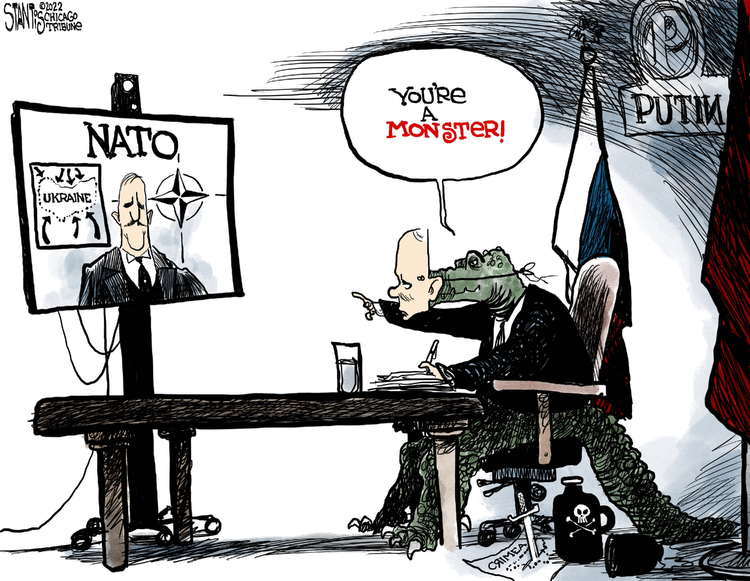CSotD: Opposition, loyal and otherwise
Skip to comments
Ann Telnaes takes a more cynical, disappointed view of last night’s press conference than I do, but I find it hard to argue with her.
Biden was thoughtful and sharp throughout the nearly two-hour presser, and I felt he exhibited candor, including his admission that he was likely going to break up the Build Back Better proposal and feed it to Congress in pieces, which was not how his optimistic remarks at the start of the session had framed it.
I’m not going to negotiate against myself as to what should and shouldn’t be in it, but I think we can break the package up, get as much as we can now, and come back and fight for the rest later.
I wish he’d entered the year with that attitude, and, while I don’t find him quite as naively trusting as Telnaes paints him, I think back to Obama’s first days, when he thought he could put together a bipartisan administration and was promptly slapped down by an opposition that openly admitted their goal was to oppose everything he proposed and to make him a one-term president.
So, okay, yes, Biden was naive to think the same crew of obstructionist powerbrokers would treat him any differently, and it falls under “fool me twice” because he was Obama’s VP and I don’t know how he could have had a better view of the futility of seeking bipartisan cooperation from this crew.
To which I would add that, while I like Kamala Harris, she’s not the sort of arm-twister VP who can go up on the Hill and get things done: LBJ was the ideal, while Humphrey, Gore and Cheney also knew how to make things happen.
It’s not Biden’s job to make things happen in Congress; he’s got other cards on the table, and, if the president is going to be a nice guy, the VP cannot be. JFK and George W were examples of that
And an observation about the press: They clearly came with their questions in hand, including the leadoff reporter who basically asked a question the answer to which had been fully contained in Biden’s opening remarks.
He might have probed a specific point, but he wasn’t prepared, he hadn’t been listening and he simply called for a regurgitation of what the president had just said. Several other reporters similarly gave the clear impression that they had walked into the room knowing what they were going to write and were simply seeking quotes to flesh out their story.
Worse, when Jake Tapper led the post-conference discussion on CNN, he led off not by asking the panel what they thought of the press conference but of directly asking them how much they felt Biden had failed and what his staff would have to work to repair.
That’s not how journalism is supposed to work, and the WHCA could use fewer preening peacocks and more sharp-eyed raptors.
Though it’s a good excuse to direct you to this morning’s Reliable Sources newsletter, which offers several links to reactions to the event and a good overview.

Scott Stantis offers some old-fashioned “loyal opposition,” and, while this cartoon was published prior to the press conference, it’s a reasonable critique of the Russia/Ukraine situation.
I continue to think Biden is playing his cards well in this crisis, and I was impressed with what he revealed and what he concealed in response to NYTimes reporter David Sanger:

I’m also struck by the disloyal opposition, as Tucker Carlson is actually justifying Putin’s desire to invade Ukraine by asking how we would feel if the Russians were arming Mexico.

To which the obvious answer is “Probably the same way we felt when they armed Cuba, dumbass.”
Except that we haven’t put nuclear weapons in Ukraine, and, besides, the Cuban Missile Crisis occurred at the height of the Cold War and was, at least in part, a reaction to our futile, foolish, disastrous Bay of Pigs invasion the year before.
We’ve learned a lot since then and Vladimir Putin is a very smart man who can ponder things himself: The Soviets provided both financial and military support to Cuba for decades, but, beyond that fraught moment in 1962, Cuba was more of an annoyance than a credible threat to the United States.
Similarly, Ukraine is no threat to Russia, and we’d all do well right now to be cool like little Fonzies.
Biden is not withdrawing our existing forces from our NATO allies, he is promising to assist Ukraine if there is an invasion, and I think he’s right that meaningful sanctions, not just against the oligarchs we’ve targeted in past dust-ups but against the overall Russian economy, would put Putin in a very untenable position.

Another opposition voice offers a reminder that, while political commentators should never refuse to confront an opponent, there are targets that should give one pause.
Steve Kelley (Creators)’s cartoon sent me scrambling for Google News to find out what George Soros had done to get him so riled up.
Turns out the Capital Research Center published a report revealing that Soros has contributed to the campaigns of two dozen progressive district attorneys.
Which is about as stunning as if they had revealed that Ben Roethlisberger has played professional football.
It’s simply not news, any more than it is news that other wealthy billionaires give money to pet causes: The Capital Research Center, for instance, is funded by the Koch and Scaife families because it reflects their rightwing goals.
Which raises the pot/kettle factor.
The hesitance I’d feel in attacking Soros specifically for his well-known, open pattern of supporting liberal causes comes in light of his stature as the pet villain of some truly reprehensible anti-semites and Q-Anon types.
It’s not fair to say that “Birds of a feather flock together,” but it’s certainly true that “A man is known by the company he keeps,” and George Soros would have to burn down an orphanage before I’d climb into bed with his enemies.
Though it does call to mind an Irish ditty that references Robert Briscoe, an Irish Jew who did all sorts of things the Capital Research Center would likely not condone.
I’ll let Tommy Makem introduce the song:
Comments 3
Comments are closed.